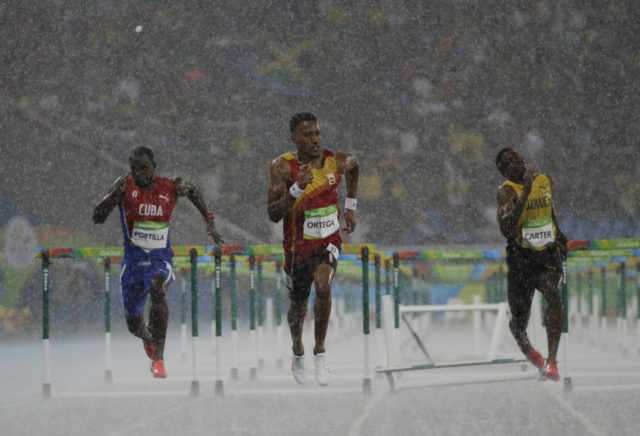As the Olympics fortnight comes to a close, Cuban government propagandists are beginning to cope with the outstanding success of Cuban exile athletes competing under another flag, and often actively disassociating from the communist regime.
Cuban-born athletes and members of the Cuban diaspora born abroad have begun to vex the communist Castro government, as primetime television smears the athletes as less worthy of their ethnic identity. Most notably is the derisive commentary of Randy Alonso Falcón, host of the primetime commentary show Mesa Redonda, who dismissed Cuban-Spanish runner Orlando Ortega Echeverría as an “ex-Cuban” for winning his silver media for Spain.
“The case of ex-Cuban Orlando Ortega and other cases of athletes have added to the controversy [at the Olympics],” Alonso claims, adding that “the growing influence of money” has clearly “damaged” the sports world. He does not elaborate on what it means to be an “ex-Cuban,” or who with Cuban roots living abroad qualifies, but a lack of loyalty to the Cuban Communist Party may qualify someone to be stripped of their ethnic identity by the television host.
Cuban athletes have surfaced to represent almost every corner of the globe during this year’s Olympics, and many are openly hostile to Cuba. Ortega was among them, apparently stroking the ire of propagandist Alonso after rejecting a Cuban flag after winning a silver medal in the Men’s 110M hurdles event. “They gave me a Cuban flag, but I wanted the Spanish one,” he told reporters. “When I get home I’m going to eat a paella.”
Speaking to reporters following his victory, which broke a long drought in track and field medals for the European nation, he repeatedly emphasized the value of his victory for Spain. “I want to thank Spain for trusting in me,” he said. “There will be many more victories for Spain, for my family, for everyone who trusted in me,” he added, notably leaving out the country of his birth.
Joining him in rejecting the potential that his victory would be used to bolster the image of the Cuban government was Yasmani Copello, a runner who secured the bronze medal in the 400M hurdles event. “This medal is for me and my new country,” the young Cuban-Turk told reporters. “I am very grateful to be Turkish…. I don’t think about Cuba.”
In an interview, Lorenzo Sotomayor, a newly-minted Azeri, echoed this sentiment. “If I were still in Cuba, I would not have come to the Olympic Games. I would be in the streets ‘struggling’ to earn a livelihood and feed my two children.” Sotomayor at press time has guaranteed Azerbaijan a place in the boxing superlightweight division semi-finals after defeating Yasnier Toledo, representing the Cuban government.
The list of Cubans representing nations far from home goes on. On team Italy, Osmany Juantorena will play in the men’s volleyball semifinals against the United States. The Italian women’s relay race will feature Cuban-born Libania Grenot. And even Qatar boasts a Cuban athlete: Rafael Da Costa Capote, a member of their handball team.
The Cuban government has not openly referred to any of these athletes with hostility, only openly attacking Ortega — who rejected the Cuban flag — and Cuban-American athletes. Ciber Cuba put together a list of Cuban athletes competing abroad, but left out all Cubans competing for the United States.
The list of Cuban-American athletes competing in Olympic history is a long one, and this year’s includes big names like gymnast Danell Leyva, judoka Angelica Delgado, and arguably the most talked-about athlete of the Games, swimming champion Ryan Lochte.
The Cuban state newspaper Granma has as of press time not weighed in on Lochte’s ongoing saga in Rio de Janeiro, which has culminated in Brazilian police forcing his teammate to hand over $11,000 after four American swimmers were corralled at gunpoint at a gas station following a drunken exchange with employees there. It has referred to the Cárdenas-born Leyva, however, implying that his silver medal in the men’s parallel bars event was unmerited.
A column on the state-run site Ciber Cuba titled “Judge’s Blindness Hurts Cuban Gymnast Manrique Larduet” argues Leyva’s parallel bars routine “showed a light imbalance in the stand above the bar” and featured “a dismount with no height and barely any complexity.” Larduet, the Cuban gymnast, placed fifth, but Cuba’s state media claims his routine “flew high like no one else.”
“The judges saw nothing,” the column laments, “they saw what they wanted to see.”

COMMENTS
Please let us know if you're having issues with commenting.